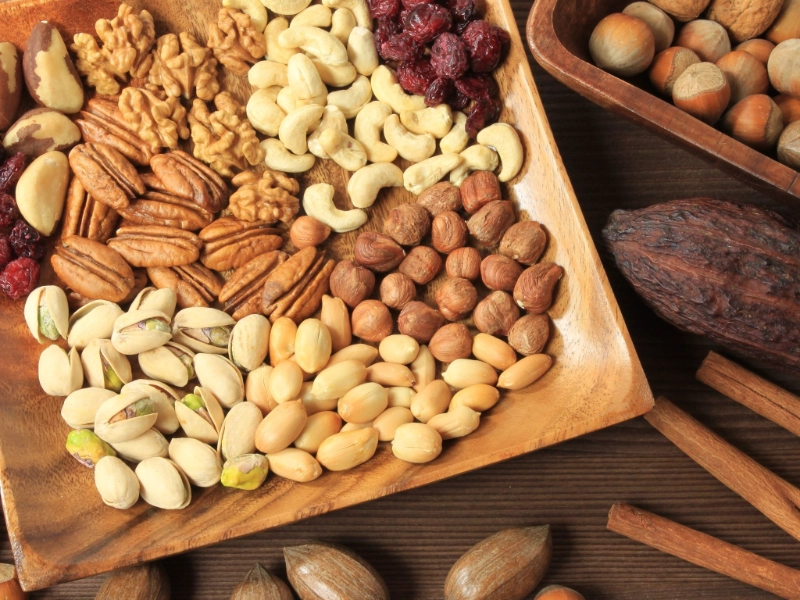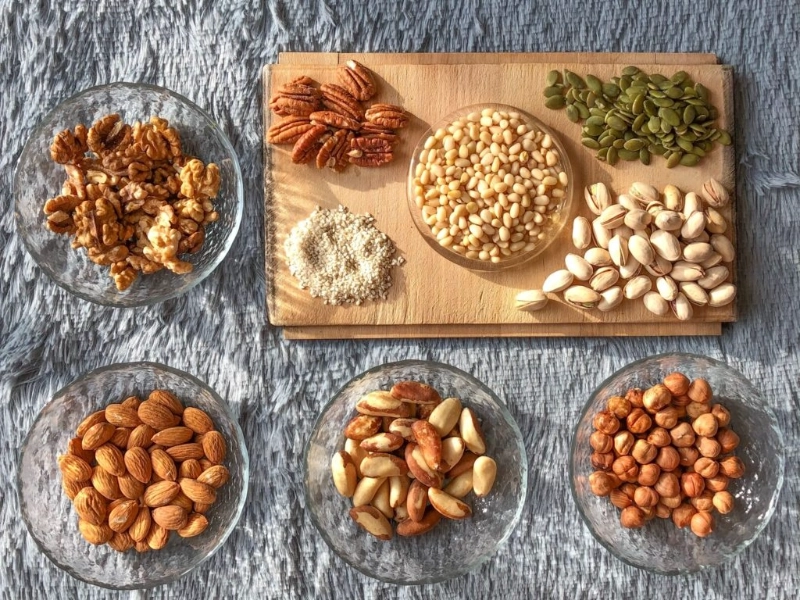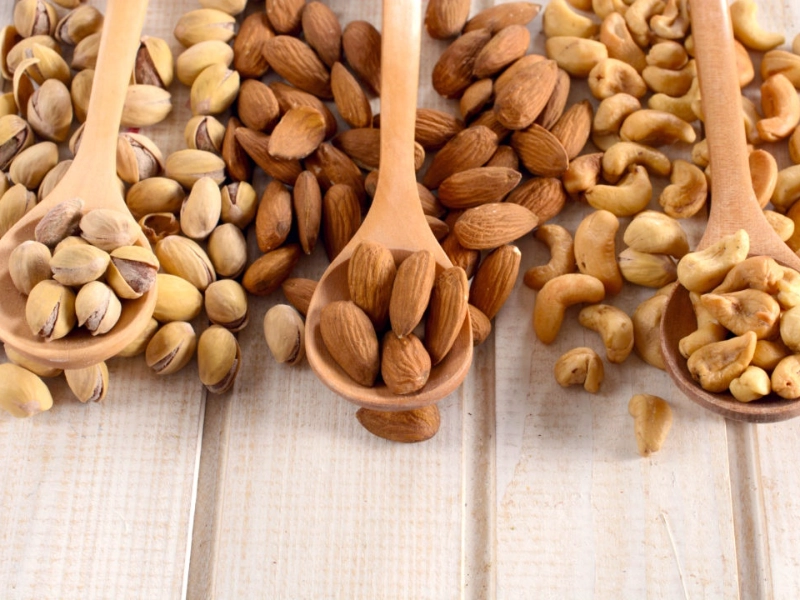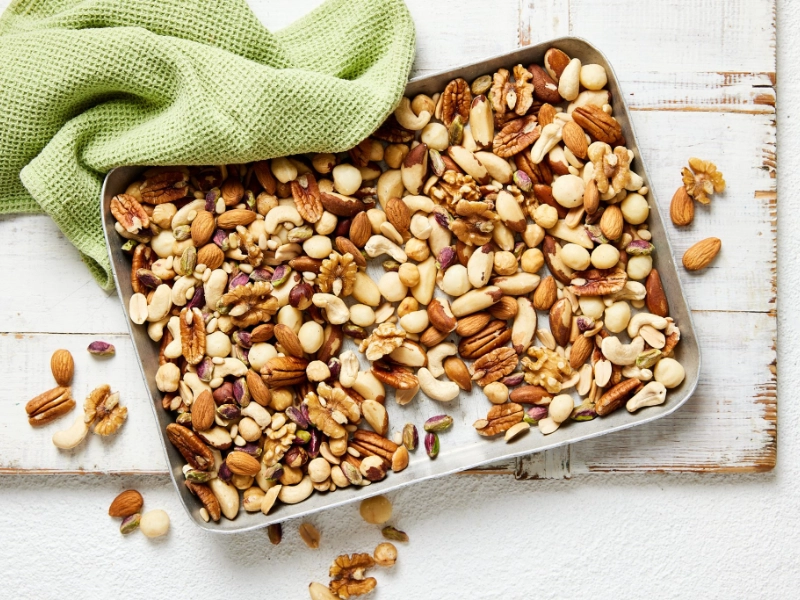Nuts And Fertility: Supporting Reproductive Health Naturally
Nutritional powerhouses with plenty of elements required to maximise fertility are nuts. These comprise protein, omega-3 fatty acids, vitamin E and zinc. Research on a diet high in nuts has revealed that it increases sperm count, motility, and DNA fragmentation quality. Additionally low in glycemic index, nuts control blood sugar response.
Protein

Omega-3 Fatty Acids
 High in omega-3 fatty acids, nuts help men and women balance hormones. Rich in selenium, zinc, and vitamin E—all of which are vital for fertility—are they also [03] By lowering oxidative stress, which can harm sperm DNA and lower their motility, these minerals maintain sperm health.
Consuming ≥ 60 grammes of nuts daily greatly enhanced sperm characteristics including motility, vitality, and morphology compared to individuals who did not eat nuts, according a new systematic review and meta-analysis of four trials totalling 875 participants. [4] [ The two randomised controlled trials in this study, however, only comprised healthy men, hence it is uncertain if these findings apply to those suffering subfertility or infertility. More studies aimed at women and infertility are required to clarify this link more completely.
High in omega-3 fatty acids, nuts help men and women balance hormones. Rich in selenium, zinc, and vitamin E—all of which are vital for fertility—are they also [03] By lowering oxidative stress, which can harm sperm DNA and lower their motility, these minerals maintain sperm health.
Consuming ≥ 60 grammes of nuts daily greatly enhanced sperm characteristics including motility, vitality, and morphology compared to individuals who did not eat nuts, according a new systematic review and meta-analysis of four trials totalling 875 participants. [4] [ The two randomised controlled trials in this study, however, only comprised healthy men, hence it is uncertain if these findings apply to those suffering subfertility or infertility. More studies aimed at women and infertility are required to clarify this link more completely.
Vitamin E
 Rich in vitamin E, nuts help produce testosterone and shield sperm from harm. For males, this hormone is essential for fertility since it affects the quality of sperm (including motility and shape) and helps to control hormonal balances associated to fertility.
Another element that can aggravate infertility is oxidative stress, which vitamin E has also been shown to help lower. Nutrients like these abound in nuts, especially brazil nuts, almonds, hazelnuts, walnuts.
Studies have indicated that a few walnuts in the diet can help with several aspects of sperm health, including motility and count. Men in the nut group had noticeably better sperm motility and shape and less DNA fragmentation when daily nut intake was compared to a male-fertility-oriented multivitamin.
Rich in vitamin E, nuts help produce testosterone and shield sperm from harm. For males, this hormone is essential for fertility since it affects the quality of sperm (including motility and shape) and helps to control hormonal balances associated to fertility.
Another element that can aggravate infertility is oxidative stress, which vitamin E has also been shown to help lower. Nutrients like these abound in nuts, especially brazil nuts, almonds, hazelnuts, walnuts.
Studies have indicated that a few walnuts in the diet can help with several aspects of sperm health, including motility and count. Men in the nut group had noticeably better sperm motility and shape and less DNA fragmentation when daily nut intake was compared to a male-fertility-oriented multivitamin.
Zinc
 Working with around 300 enzymes in the body, zinc is a basic trace mineral that maintains cell function. It is absolutely important for the development of sperm and embryos, hormonal balance, and avoidance of chromosomal abnormalities.
Important for fertility in both dads and mothers, the seeds and nuts in this diet offer zinc, omega-3 fatty acids, folate, vitamin E and selenium. These minerals cooperate to regulate testosterone levels in fathers and encourage normal ovulation in mothers.
A zinc deficit can impair the skin; bones; digestive, reproductive, central nervous, immunological systems; eyes; hair; and sense of smell among other tissues and organs. It can strike those without enough foods high in this nutrient or those with chronic illnesses that compromise their capacity for absorption and usage. Pregnancy has raised zinc needs. Adults usually do not lack this mineral in any significant degree.
Working with around 300 enzymes in the body, zinc is a basic trace mineral that maintains cell function. It is absolutely important for the development of sperm and embryos, hormonal balance, and avoidance of chromosomal abnormalities.
Important for fertility in both dads and mothers, the seeds and nuts in this diet offer zinc, omega-3 fatty acids, folate, vitamin E and selenium. These minerals cooperate to regulate testosterone levels in fathers and encourage normal ovulation in mothers.
A zinc deficit can impair the skin; bones; digestive, reproductive, central nervous, immunological systems; eyes; hair; and sense of smell among other tissues and organs. It can strike those without enough foods high in this nutrient or those with chronic illnesses that compromise their capacity for absorption and usage. Pregnancy has raised zinc needs. Adults usually do not lack this mineral in any significant degree.








